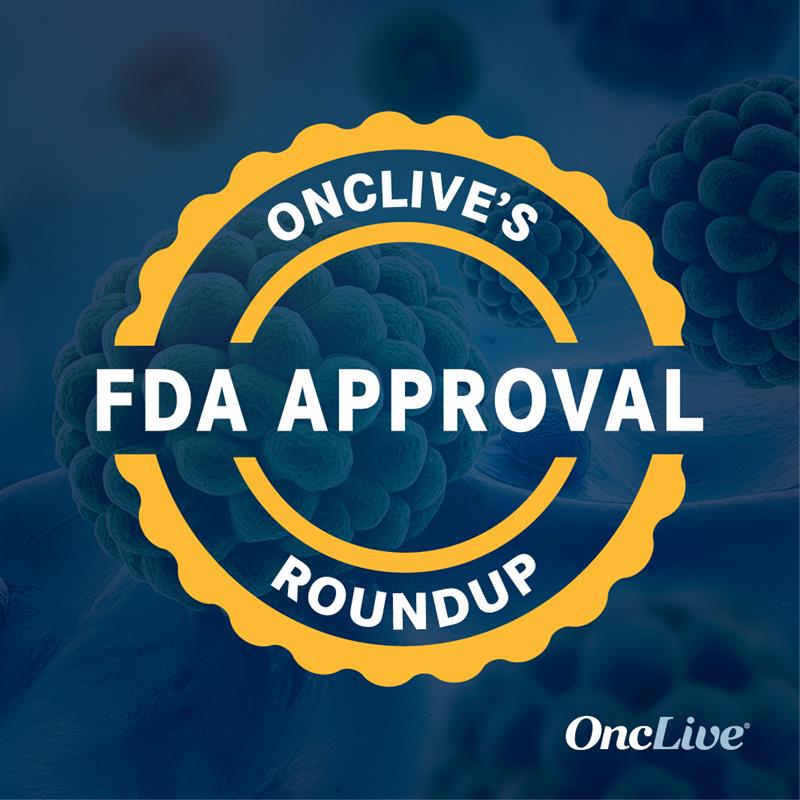FDA Approval Roundup: July
Below is your guide to all the oncologic therapeutic options approved by the FDA in July 2025. The roundup provides everything you need to know, right at your fingertips—all the topline data that supported the decisions and expert insights contextualizing what they mean for clinical practice.
Indication: The FDA granted accelerated approval to linvoseltamab-gcpt (Lynozyfic) for the treatment of adult patients with relapsed or refractory multiple myeloma who have received at least four prior lines of therapy, including a proteasome inhibitor, an immunomodulatory agent, and an anti-CD38 monoclonal antibody.
Supporting Data: The decision was based on data from the phase 1/2 LINKER-MM1 trial (NCT03761108), in which the BCMA-directed CD3 T-cell engager elicited an objective response rate (ORR) of 70% (95% CI, 59%-80%), including a complete response rate of 45% (95% CI, 34%-57%). The median time to response was under 1 month, and the median duration of response (DOR) had not yet been reached at a median follow-up of 11.3 months. An estimated 72% of responders maintained their response at 12 months. Safety data showed manageable adverse effects (AEs), although the label includes a Boxed Warning for cytokine release syndrome and neurologic toxicity.
Clinical Significance: Linvoseltamab adds a new off-the-shelf BCMA-targeted option for heavily pretreated patients with limited treatment alternatives. Its response-adapted dosing schedule may help reduce treatment burden while providing deep and durable responses, offering a valuable addition to the growing armamentarium in late-line multiple myeloma.
In an exclusive interview with OncLive®, Joshua Richter, MD, of Tisch Cancer Institute, Mount Sinai, further discussed the clinical significance of the decision:
OTHER RELATED COVERAGE
- In August 2024, the FDA issued a complete response letter to the biologics license application for linvoseltamab in this population, citing findings from a pre-approval inspection at a third-party fill/finish manufacturer for another company’s product candidate.
Suzanne Lentzsch, MD, PhD

- In a recent Peer Exchange panel, experts discussed the results of studies evaluating additional bispecific regimens in the later-stage relapsed/refractory multiple myeloma space, including linvoseltamab in LINKER-MM1.
- In an earlier interview, Suzanne Lentzsch, MD, PhD, of Columbia University Herbert Irving Comprehensive Cancer Center, discussed earlier safety data with linvoseltamab in this patient population.
- In another interview, Sundar Jagannath, MBBS, of The Tisch Cancer Institute, Mount Sinai, discussed the potential utility of treatment with linvoseltamab in those with triple-class–exposed multiple myeloma.
- Hans Lee, MD, of The University of Texas MD Anderson Cancer Center, unpacked the rationale for the phase 1/2 LINKER-MM1 trial examining linvoseltamab.
Indication: The FDA granted accelerated approval to sunvozertinib (Zegfrovy) for the treatment of adult patients with locally advanced or metastatic non–small cell lung cancer (NSCLC) harboring EGFR exon 20 insertion mutations whose disease has progressed on or following platinum-based chemotherapy. The decision is contingent on the use of an FDA-approved companion diagnostic.
Supporting Data: Efficacy was demonstrated in the WU-KONG1b trial (NCT03974022), where the agent given at the 200-mg dose produced an ORR of 46% (95% CI, 35%-57%) and a median DOR of 11.1 months. Safety findings showed manageable toxicity, with most treatment-related AEs (TRAEs) being grade 1 or 2. Grade 3 or higher TRAEs were infrequent, and discontinuations due to these toxicities occurred in just 6.3% of patients.
Clinical Significance: Sunvozertinib provides a targeted treatment option for a historically hard-to-treat NSCLC subgroup with EGFR exon 20 insertion mutations, patients who often do not respond well to standard EGFR inhibitors. Its manageable safety profile and meaningful efficacy offer a much-needed therapeutic alternative for patients after platinum therapy.
In an exclusive interview, Lyudmila A. Bazhenova, MD, of University of California San Diego (UCSD), UCSD Moores Cancer Center, further unpacked the significance of the decision:
ALSO APPROVED: The FDA cleared the Oncomine™ Dx Express Test on the Ion Torrent™ Genexus™ Dx Integrated Sequencer as an in vitro diagnostic assay for use as a companion diagnostic for sunvozertinib in EGFR exon 20 insertion mutation–positive NSCLC, and for use in tumor profiling.
OTHER RELATED COVERAGE
- In a recent episode of OncLive On Air, Apar Kishor Ganti, MD, and Allison Cushman-Vokoun, MD, PhD, FCAP, further unpacked the FDA approval of the Oncomine DX Express Test for use as a companion diagnostic for the agent and for use in tumor profiling.
- In April 2024, the FDA granted breakthrough therapy designation to sunvozertinib as a first-line treatment for patients with locally advanced or metastatic NSCLC with EGFR exon 20 insertion mutations.

- In August 2023, the National Medical Products Administration (NMPA) of China cleared sunvozertinib for those with locally advanced or metastatic NSCLC harboring EGFR exon 20 insertion mutations whose disease has progressed on or after platinum-based chemotherapy. In October 2024, the NMPA’s Center for Drug Evaluation also granted breakthrough therapy designation to sunvozertinib for frontline use in this population. In the same month, marketing approval was granted to LungCure CDx, a next generation sequencing–based companion diagnostic, to guide the use of the agent.
- In a previous interview, D. Ross Camidge, MD, PhD, of University of Colorado Anschutz Medical Campus in Aurora, Colorado, discussed the potential utility of sunvozertinib in this population, the efficacy and safety data observed with the agent, and future research directions.
- In a prior interview, David Planchard, MD, PhD, of Gustave Roussy, discussed the benefit of sunvozertinib in this population.
Indication: The FDA has cleared SIR-Spheres® Y-90 resin microspheres for the treatment of patients with unresectable hepatocellular carcinoma (HCC) who have no macrovascular invasion, Child-Pugh A cirrhosis, well-compensated liver function, and good performance status.
Supporting Data: The decision was based on data from DOORwaY90 (NCT04736121), a prospective, multicenter, single-arm trial. which evaluated SIR-Spheres as a first-line treatment in patients with unresectable HCC. In the interim efficacy cohort (n = 65), the ORR was 98.5% per independent central review, with a local tumor control rate of 100%. The median DOR exceeded 300 days, and the treatment was linked with a favorable safety profile.
Clinical Significance: This decision establishes SIR-Spheres as the first and only FDA-approved Y-90 radioembolization therapy for both HCC and colorectal cancer. For eligible patients with early- to intermediate-stage unresectable HCC, it offers a highly localized treatment option with impressive tumor control and safety, expanding the armamentarium of multidisciplinary liver cancer care.
“This study moves the field of radioembolization forward with reproducible dosimetry outcomes and a strong safety profile linked to very positive clinical results,” Armeen Mahvash, MD, of The University of Texas MD Anderson Cancer Center, stated in the news release. “This will give multidisciplinary care teams the confidence to recommend SIR-Spheres for HCC treatment.”
OTHER RELATED COVERAGE

- In a prior interview, Edward Kim, MD, of Mount Sinai Medical Center, discussed the future role of Y-90 glass microspheres in patients with unresectable HCC.
- In a previous Peer Exchange series, experts walked through the implications on treatment practices of the LEGACY study of Y-90 glass microspheres in patients with unresectable solitary HCC.
- In a prior interview, Kabir Mody, MD, of Mayo Clinic, discussed the unique approach used to deliver Y-90 glass microspheres in patients with unresectable HCC.
Indication: The regulatory agency has granted tentative approval to a generic tablet formulation of ibrutinib (Imbruvica), developed by Zydus Lifesciences, for the treatment of select B-cell malignancies, including chronic lymphocytic leukemia, small lymphocytic lymphoma, Waldenström macroglobulinemia, and chronic graft-vs-host disease (cGVHD).
Supporting Data: The generic tablets match the reference drug in dosage forms (140 mg, 280 mg, 420 mg) and are tentatively approved for use in the same FDA-approved indications and dosing regimens as Imbruvica. The tentative status reflects that while the generic met all approval requirements, final approval is pending resolution of exclusivity or patent protections on the reference product.
Clinical Significance: Although not yet fully marketable, the tentative approval signals potential future cost savings and expanded access to an established BTK inhibitor once exclusivities expire. It underscores the continued movement toward greater affordability in long-term oncology therapies, particularly for chronic B-cell malignancies.
Want breaking news updates sent straight to your inbox? Sign up to receive our e-newsletters.
